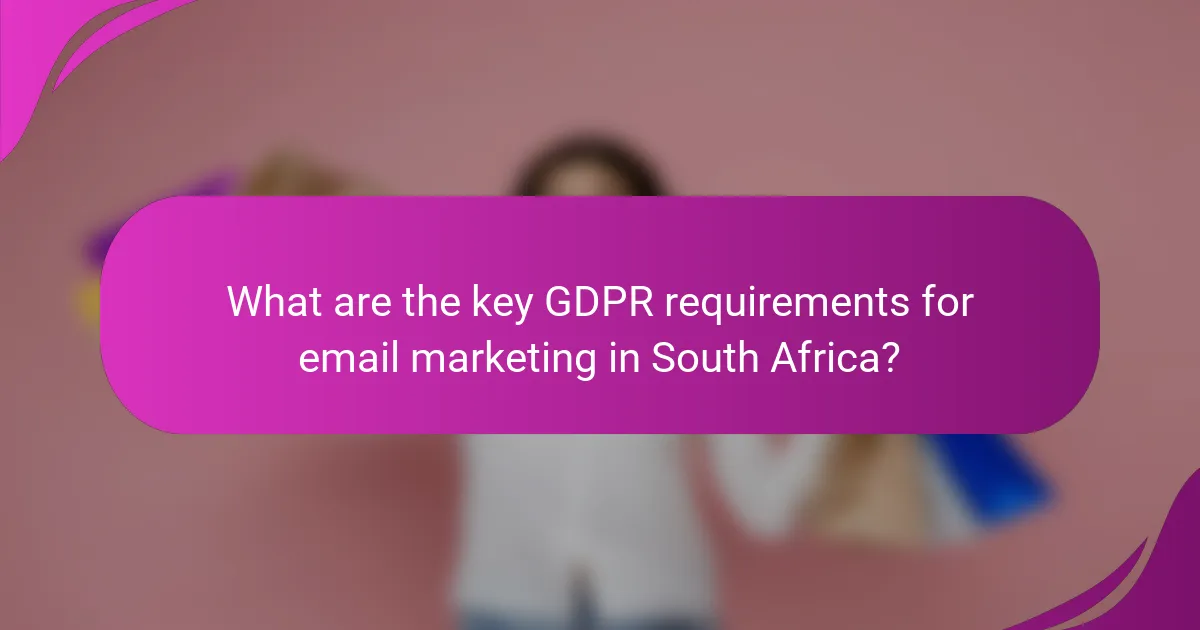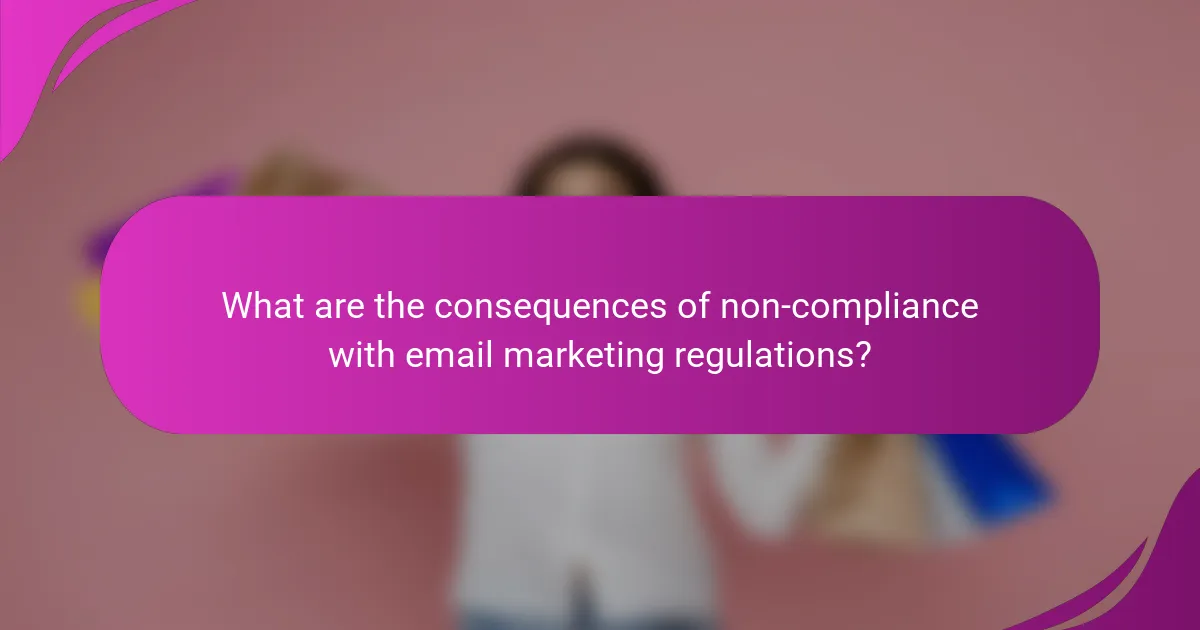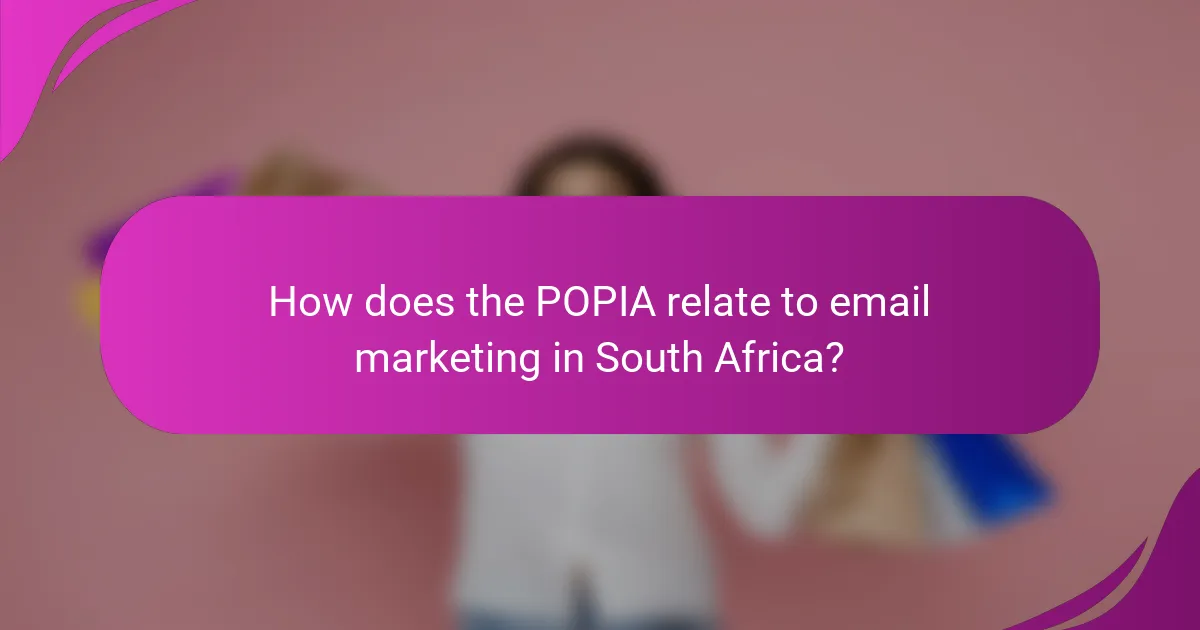Email marketing compliance is crucial for businesses operating in today’s data-driven landscape, particularly in light of regulations like the GDPR. To maintain trust and avoid penalties, companies must obtain explicit consent from individuals, respect their data rights, and implement robust data protection measures. By adhering to best practices, such as transparency and regular compliance reviews, businesses can effectively navigate the complexities of email marketing regulations.

What are the key GDPR requirements for email marketing in South Africa?
The key GDPR requirements for email marketing in South Africa focus on obtaining explicit consent from individuals, ensuring their rights to access and erase their data, and implementing strong data protection measures. Compliance with these regulations is essential for businesses to maintain trust and avoid penalties.
Consent for data processing
Obtaining consent for data processing is a fundamental requirement under GDPR. Businesses must ensure that consent is freely given, specific, informed, and unambiguous. This means that individuals should actively opt-in to receive marketing communications, rather than being pre-checked or assumed to consent.
To comply, create clear consent forms that explain how the data will be used. For example, include checkboxes for users to agree to receive newsletters or promotional offers, and provide an easy way to withdraw consent at any time.
Right to access and erasure
Individuals have the right to access their personal data and request its erasure under GDPR. This means that businesses must provide a straightforward method for users to view the information held about them and to delete it if they choose.
Implement a user-friendly process for data access requests, such as a dedicated email address or online portal. Additionally, ensure that your systems can effectively erase data upon request, in compliance with the regulations.
Data protection impact assessments
Data protection impact assessments (DPIAs) are necessary when processing personal data that may pose a high risk to individuals’ rights and freedoms. Conducting a DPIA helps identify and mitigate potential risks associated with email marketing campaigns.
To perform a DPIA, outline the nature of the data processing, assess risks, and implement measures to address those risks. This proactive approach not only helps with compliance but also builds customer trust.
Data breach notification
In the event of a data breach, GDPR mandates that businesses notify the relevant authorities and affected individuals without undue delay, typically within 72 hours. This requirement emphasizes the importance of having a robust incident response plan in place.
Establish clear protocols for identifying, reporting, and managing data breaches. Ensure that your team is trained to respond quickly and effectively, minimizing potential harm to individuals and your organization.
Privacy by design
Privacy by design is a principle that requires businesses to integrate data protection measures into their processes from the outset. This means considering privacy at every stage of email marketing campaigns, from data collection to storage and usage.
In practice, this could involve using encryption for sensitive data, limiting data retention periods, and regularly reviewing your data handling practices. By prioritizing privacy, you can enhance compliance and foster customer confidence in your brand.

How can businesses ensure compliance with email marketing regulations?
Businesses can ensure compliance with email marketing regulations by implementing best practices that align with legal standards, such as the GDPR in Europe. Key steps include obtaining explicit consent, maintaining transparency, and regularly reviewing compliance measures.
Implementing double opt-in
Double opt-in is a process where subscribers confirm their interest in receiving emails by clicking a link in a confirmation email. This method not only ensures that consent is explicitly given but also helps maintain a clean email list. By using double opt-in, businesses can reduce the risk of spam complaints and improve engagement rates.
To implement double opt-in, set up an automated email that is sent immediately after a user signs up. This email should include a clear call to action for confirming their subscription. Make sure to store the confirmation timestamp as proof of consent.
Regularly updating privacy policies
Regularly updating privacy policies is crucial for compliance with email marketing regulations. Policies should clearly outline how subscriber data is collected, used, and protected. This transparency builds trust and ensures that subscribers are aware of their rights regarding their personal information.
Review your privacy policy at least annually or whenever there are significant changes in data handling practices. Make it easily accessible on your website and notify subscribers of any updates, allowing them to understand how their data is managed.
Training staff on compliance
Training staff on compliance is essential for maintaining adherence to email marketing regulations. All team members involved in marketing, data handling, and customer service should understand the legal requirements and best practices. This knowledge helps prevent accidental violations and promotes a culture of compliance within the organization.
Consider conducting regular training sessions and providing resources that outline key regulations like GDPR. Use real-life scenarios to illustrate potential pitfalls and encourage staff to ask questions about compliance-related issues.

What are the best practices for email marketing compliance?
Best practices for email marketing compliance focus on respecting user privacy and adhering to relevant regulations. Implementing these practices can help build trust with your audience and ensure your campaigns are legally sound.
Segmenting email lists
Segmenting email lists involves dividing your audience into smaller groups based on specific criteria, such as demographics or behavior. This targeted approach allows for more personalized communication, which can lead to higher engagement rates.
Consider segmenting by factors like purchase history, location, or engagement level. For instance, you might send promotional offers to customers who have previously purchased similar products, while providing informative content to those who are less engaged.
Providing clear unsubscribe options
Offering clear unsubscribe options is crucial for maintaining compliance and user trust. Every email should include a straightforward way for recipients to opt out of future communications, typically through a visible link at the bottom of the message.
Ensure that the unsubscribe process is simple and immediate, without requiring users to navigate through multiple pages. This not only complies with regulations but also reflects positively on your brand’s commitment to customer preferences.
Using transparent data collection methods
Transparent data collection methods involve clearly informing users about how their data will be used when they sign up for your emails. This includes specifying what types of information you collect and how it will be utilized in your marketing efforts.
Utilize consent forms that explicitly state your intentions and provide users with options to control their data. For example, you might include checkboxes for users to agree to receive promotional content or to share their information with third parties.

What are the consequences of non-compliance with email marketing regulations?
Non-compliance with email marketing regulations can lead to significant financial and reputational repercussions for businesses. Failing to adhere to laws like the GDPR can result in hefty fines and damage to customer trust.
Fines and penalties
Fines for non-compliance with email marketing regulations can vary widely, often reaching into the low tens of thousands of euros or dollars. Under the GDPR, for instance, organizations can be fined up to 4% of their annual global turnover or €20 million, whichever is higher.
To avoid these penalties, businesses should ensure they have explicit consent from recipients before sending marketing emails. Regular audits of email lists and compliance practices can help identify potential issues before they escalate.
Reputational damage
Reputational damage from non-compliance can be long-lasting and detrimental to a brand’s image. Customers are increasingly aware of their rights regarding data protection, and negative publicity can lead to loss of trust and customer loyalty.
To mitigate reputational risks, companies should prioritize transparency in their email marketing practices. Clear communication about data usage and opting-out options can help maintain a positive relationship with subscribers and enhance brand credibility.

How does the POPIA relate to email marketing in South Africa?
The Protection of Personal Information Act (POPIA) governs how personal data must be handled in South Africa, including in email marketing. Businesses must ensure they obtain consent from recipients before sending marketing emails and provide clear options for opting out.
Similarities with GDPR
The POPIA shares several key principles with the General Data Protection Regulation (GDPR), particularly regarding consent and data protection. Both regulations require explicit consent from individuals before processing their personal information for marketing purposes.
Additionally, both POPIA and GDPR emphasize the importance of transparency, mandating that organizations inform individuals about how their data will be used. This includes providing clear privacy notices and ensuring data subjects can easily access their information.
Specific local requirements
In South Africa, the POPIA mandates that businesses must implement reasonable security measures to protect personal data from loss or unauthorized access. This includes maintaining records of consent and ensuring that data processing agreements are in place with third-party service providers.
Furthermore, organizations must allow individuals to withdraw consent at any time, and they should have a straightforward process for recipients to opt out of marketing communications. Failure to comply with POPIA can result in significant penalties, emphasizing the need for businesses to prioritize compliance in their email marketing strategies.


